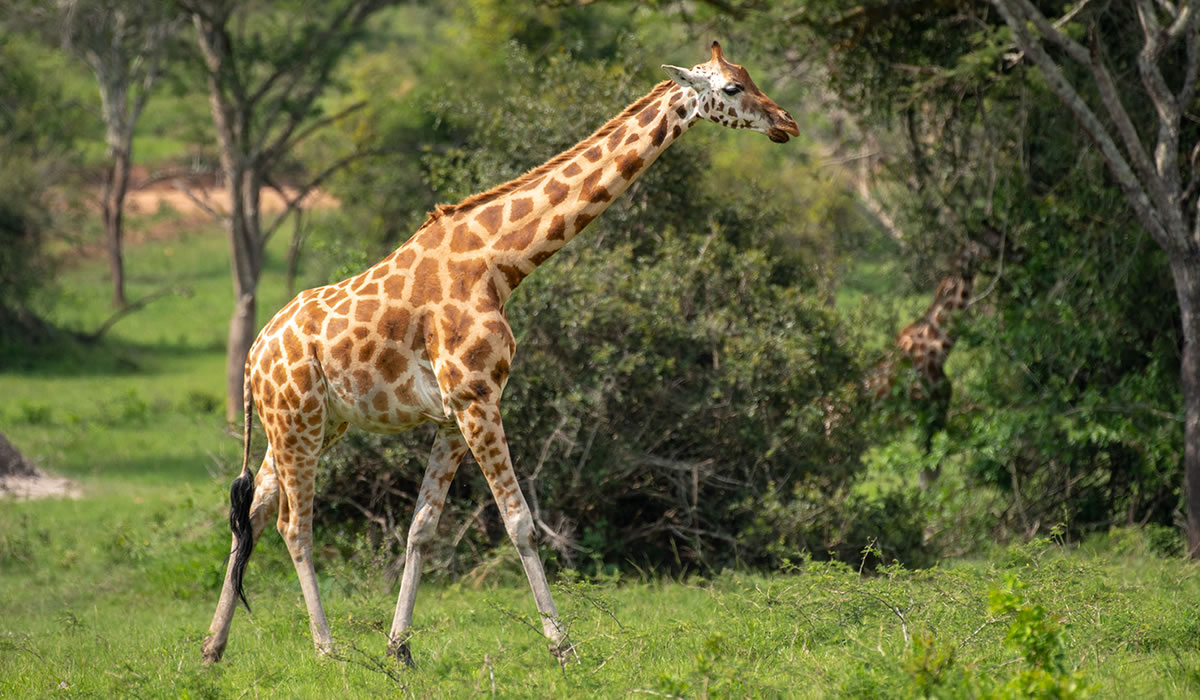Lake Mburo National Park, located in southwestern Uganda, is a unique and intimate safari destination known for its scenic landscapes, diverse wildlife, and serene lake ecosystems. Covering approximately 260 square kilometers, it is the smallest of Uganda’s savannah parks but offers an exceptional wildlife experience. The park lies in the districts of Mbarara, Kiruhura, and Ibanda, and is easily accessible from Kampala, making it a popular choice for travelers seeking a short safari without compromising on wildlife encounters. With rolling hills, acacia woodlands, papyrus swamps, and sparkling lakes, Lake Mburo combines picturesque scenery with exciting safari adventures.

Lake Mburo National Park is distinguished by its varied landscapes, which include open savannahs, wooded hills, swampy wetlands, and over 20 small lakes, the largest being Lake Mburo itself. The park’s rolling hills are dotted with acacia and fig trees, while the wetlands and papyrus swamps support a wide range of bird species and aquatic life. The interconnected lakes and rivers serve as crucial water sources for wildlife, especially during the dry season, and add a serene and reflective beauty to the park’s vistas.
The park’s ecosystems are interconnected, creating a rich biodiversity that supports both terrestrial and aquatic species. The mixture of hills, plains, and wetlands allows visitors to enjoy varied safari experiences, from game drives and boat safaris to walking and cycling adventures. The relatively small size of the park ensures that wildlife sightings are frequent and accessible, making it ideal for travelers with limited time.
Wildlife in Lake Mburo National Park
Lake Mburo National Park is home to over 70 mammal species and around 350 bird species, making it a significant conservation area in Uganda. The park supports populations of zebras, impalas, elands, hartebeests, warthogs, bushbucks, reedbucks, and topis, many of which are rare in other parts of Uganda. The plains are ideal for spotting zebras and antelopes grazing together, providing classic African savannah scenes that delight photographers and wildlife enthusiasts.
Predators such as leopards, jackals, and hyenas are present but tend to be elusive, making sightings particularly rewarding. Hippos dominate the park’s lakes and rivers, while crocodiles can be seen basking along the water’s edge. The wetlands and papyrus swamps attract large numbers of birds, including the African fish eagle, herons, kingfishers, and the rare shoebill stork. Lake Mburo is one of the few parks in Uganda where visitors can combine traditional savannah wildlife viewing with excellent birdwatching and aquatic wildlife observation.
Primate enthusiasts can also enjoy encounters with black-and-white colobus monkeys and vervet monkeys that inhabit the park’s forested patches. These primates add a dynamic aspect to walking safaris and provide opportunities for close-up wildlife experiences in a relatively small area.
Activities in Lake Mburo National Park
Lake Mburo National Park offers a variety of safari activities that cater to different interests and levels of adventure.
Game Drives
Game drives are the primary activity in Lake Mburo, offering visitors a chance to see zebras, impalas, buffaloes, warthogs, and occasionally predators such as leopards. Early morning and late afternoon drives are ideal for spotting wildlife, as animals are most active during these cooler periods. Experienced guides accompany visitors, providing insights into animal behavior, the ecosystem, and conservation efforts.
Boat Safaris
Boat safaris on Lake Mburo and its smaller lakes provide a different perspective of the park. Visitors can see hippos, crocodiles, and a variety of bird species from the water, enjoying peaceful and scenic views of the surrounding hills. Sunset boat rides are particularly memorable, with the golden light reflecting off the lake and wildlife visible along the banks.
Walking Safaris
Lake Mburo is one of the few parks in Uganda that allows guided walking safaris, offering an immersive and educational experience. Walking safaris allow visitors to observe animal tracks, smaller mammals, birds, insects, and plant life up close. The relatively open terrain and smaller size of the park make walking safaris both safe and rewarding.
Cycling Safaris
Cycling through Lake Mburo National Park has become increasingly popular due to the park’s manageable size and scenic trails. Visitors can explore savannah plains, rolling hills, and woodland areas on mountain bikes, guided by park rangers. Cycling offers a unique combination of exercise, adventure, and wildlife observation, providing an unforgettable way to experience the park.
Birdwatching Tours
Birdwatchers will find Lake Mburo to be a haven, with over 350 species recorded. The park’s diverse habitats, including lakes, wetlands, woodlands, and grasslands, support a wide variety of resident and migratory birds. Guided birdwatching tours help visitors identify species such as African fish eagles, hammerkops, jacanas, kingfishers, and the rare shoebill stork. Birdwatching is particularly rewarding during the wet season, when migratory species populate the lakes and wetlands.
Cultural Experiences
Visitors can engage with local communities surrounding Lake Mburo National Park, learning about traditional lifestyles, agriculture, and crafts. Cultural experiences include visiting local villages, observing traditional ceremonies, and purchasing handcrafted items. These activities promote sustainable tourism and provide support to communities living near the park.
Accommodation in Lake Mburo National Park
Lake Mburo National Park offers a range of accommodations to suit different budgets and preferences. Luxury lodges such as Mihingo Lodge, Rwakobo Rock, and Enganzi Lodge provide comfortable rooms, excellent dining, and organized safari experiences. Mid-range lodges like Mantana Tented Camp and Kigarama Safari Lodge offer cozy stays with access to guided tours and wildlife activities. Budget travelers can choose community-run campsites and guesthouses near park entrances, providing affordable lodging without compromising the safari experience.
Many lodges are strategically located near lakes or main game viewing areas, allowing guests easy access to safari activities, boat rides, and nature walks. Accommodation in Lake Mburo often emphasizes eco-friendly practices, blending with the natural environment and supporting conservation initiatives.
Best Time to Visit Lake Mburo National Park
The park can be visited throughout the year, but the best time for wildlife viewing is during the dry seasons from December to February and June to September. During these months, animals gather around water sources, making sightings more predictable. The dry season also makes roads and trails more accessible for game drives, walking, and cycling safaris.
The wet seasons, from March to May and October to November, bring lush vegetation, spectacular scenery, and abundant birdlife. While some areas may be muddy or harder to access, the green landscapes offer unique photographic opportunities and vibrant wildlife experiences.
Getting to Lake Mburo National Park
Lake Mburo National Park is located approximately 230 kilometers southwest of Kampala. Travelers can reach the park by road in 4 to 5 hours, passing through scenic countryside, tea plantations, and small towns. The park’s main entrance is the Sanga Gate, which provides access to game drives, walking trails, and accommodation facilities.
For visitors combining Lake Mburo with other southwestern Uganda destinations, such as Bwindi Impenetrable Forest, Queen Elizabeth National Park, or the Ishasha sector, the park serves as an accessible and scenic stopover for multi-destination safaris.
Conservation and Community Engagement
Lake Mburo National Park is managed by the Uganda Wildlife Authority, which focuses on protecting wildlife, conserving ecosystems, and promoting sustainable tourism. Conservation efforts include anti-poaching patrols, habitat restoration, and community education programs that raise awareness about the importance of preserving biodiversity.
Local communities benefit from tourism through employment opportunities, handicraft sales, guided tours, and cultural interactions. Community engagement ensures that tourism supports sustainable development, while eco-friendly lodges and responsible travel practices help minimize the impact on the park’s delicate ecosystems.
Lake Mburo National Park offers a unique safari experience in Uganda, combining stunning landscapes, diverse wildlife, and intimate encounters with nature. From the grazing zebras and impalas on the rolling plains to hippos and birds along the lakes and wetlands, the park provides a wide range of memorable activities for travelers of all interests. Its manageable size, scenic vistas, and accessibility make it an ideal destination for both short trips and multi-day safaris.
Whether on a game drive, boat safari, walking or cycling adventure, or birdwatching tour, Lake Mburo National Park delivers unforgettable wildlife encounters and immersive experiences in a tranquil setting. For anyone exploring southwestern Uganda, it is a must-visit destination that offers both the excitement of a classic African safari and the serenity of pristine lake and woodland environments.

